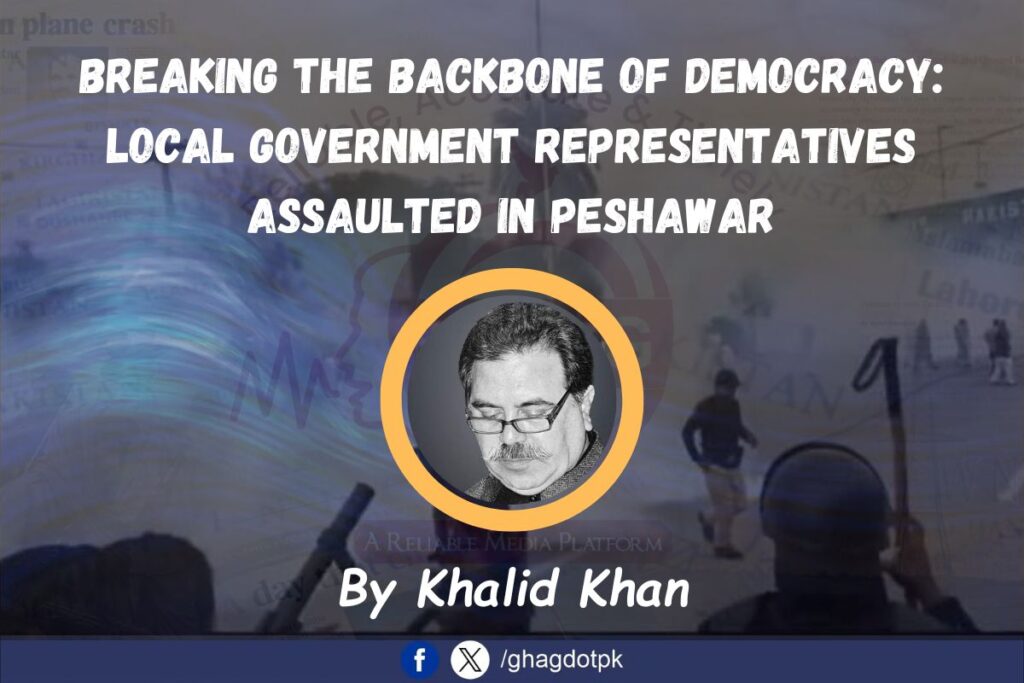By Khalid Khan
In a troubling escalation in Peshawar, local government representatives – who serve as the direct voice of the people – were met with force as they peacefully protested outside the Provincial Assembly. What should have been a display of democratic expression turned into a confrontation with authorities as the police, under the orders of provincial leaders, unleashed tear gas shells and baton charges on the peaceful demonstrators.
The incident highlights a growing concern over the state of democracy in Pakistan and the erosion of the rights of elected representatives at the local level. Local government representatives, who are the true embodiment of the people’s voices, have faced oppression in their pursuit of basic rights and adequate resources for their communities. Their demands, centered around the lack of funds and shrinking authority, were met with violent repression instead of dialogue or negotiation.
As the elected representatives from the local councils of the province gathered in Peshawar, they called for attention to the issues of inadequate funds and a reduction in their powers, challenges that have severely impacted their ability to serve their constituencies. Their peaceful protest was intended to make their voices heard on behalf of the citizens they represent, yet they were met with tear gas, baton charges, and, most concerning, arrests.
This brutal response raises serious questions about the government’s commitment to democratic values. The right to peaceful protest is a cornerstone of any democracy, allowing citizens and their elected representatives to voice concerns, push for reforms, and demand accountability. When such protests are met with violence, it signals a broader disregard for democratic principles and a willingness to use force over dialogue. The actions taken by the provincial police under the leadership of Ali Amin Gandapur were not just a response to a protest; they were an attack on the very foundation of democracy itself.
The tragic irony lies in the statements and behavior of Ali Amin Gandapur, the incumbent provincial minister, who frequently criticizes the federal government and accuses it of overstepping its bounds. Yet, when faced with local demands for basic resources and governance, he turned a blind eye, opting instead for oppressive measures to stifle dissent. His failure to address local concerns and his disregard for the well-being of his constituents have become a source of frustration, not only for the local leaders but for the general public as well.
This incident also casts a shadow over the effectiveness and legitimacy of the provincial government. The police’s violent response to the peaceful protest in front of the Khyber Pakhtunkhwa Assembly is a clear indication that the provincial government is failing in its responsibility to uphold the rights of its people. The fact that local government representatives are being treated with such disdain suggests a larger breakdown in the relationship between the people and their elected officials.
The suppression of the protest is not just an isolated event; it has the potential to spark a wider movement. The anger and frustration felt by local government officials are mirrored by the people they represent, who are equally dissatisfied with the lack of services, resources, and attention from the provincial administration. This can lead to larger protests and unrest, which could further destabilize the already fragile political situation in the province.
Legal and moral implications also loom large. Legally, citizens in Pakistan are granted the right to peaceful assembly, and this right should be protected by the state. The government’s response to the protest has, in effect, violated this right, using state power to crush dissent rather than listen to the concerns of its people. Morally, the treatment of elected representatives with such brutality reflects a complete disregard for the principles of accountability and public service.
The aftermath of this event is likely to be felt not only in the political corridors of Peshawar but across the nation. Local leaders who once worked in cooperation with the provincial government may now find themselves alienated, and the trust between the people and their representatives may erode further. The consequences of this will be felt in the political, social, and economic realms as the government loses credibility in the eyes of the very people it is meant to serve.
In conclusion, the recent actions taken against local government representatives are a wake-up call for Pakistan’s democracy. The government must recognize the importance of dialogue, negotiation, and respect for democratic values. The need for a strong local government system is vital for the stability of the country, and the government must ensure that these representatives can fulfill their duties without fear of repression. The suppression of their rights only serves to further complicate the issues they are trying to address, and it is the government’s responsibility to create an environment where all citizens, including their representatives, can have their voices heard and their concerns addressed.
This event stands as a powerful reminder that true democracy cannot flourish in an atmosphere of fear and oppression. It is time for the provincial government to step up, listen to the demands of its people, and restore the values of democracy that are essential for the country’s progress.






